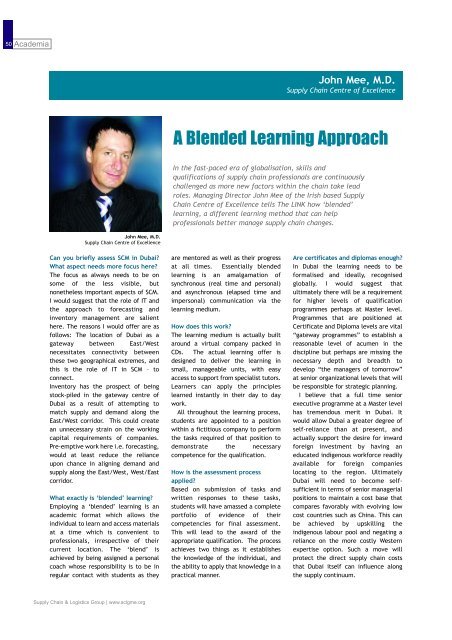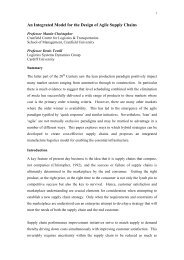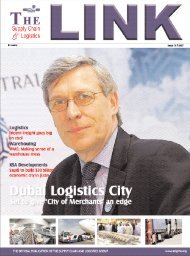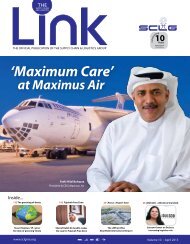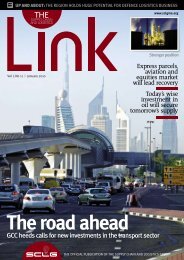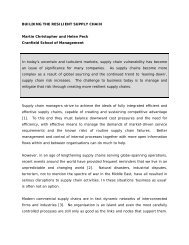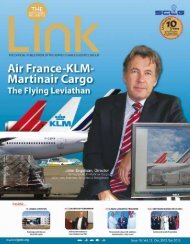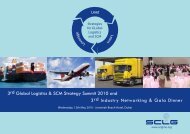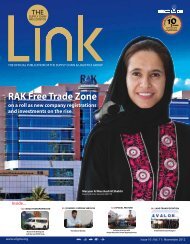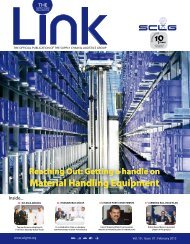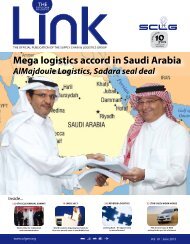Create successful ePaper yourself
Turn your PDF publications into a flip-book with our unique Google optimized e-Paper software.
50<br />
Academia<br />
John Mee, M.D.<br />
Supply Chain Centre of Excellence<br />
A Blended Learning Approach<br />
In the fast-paced era of globalisation, skills and<br />
qualifications of supply chain professionals are continuously<br />
challenged as more new factors within the chain take lead<br />
roles. Managing Director John Mee of the Irish based Supply<br />
Chain Centre of Excellence tells The LINK how ‘blended’<br />
learning, a different learning method that can help<br />
professionals better manage supply chain changes.<br />
John Mee, M.D.<br />
Supply Chain Centre of Excellence<br />
Can you briefly assess SCM in Dubai?<br />
What aspect needs more focus here?<br />
The focus as always needs to be on<br />
some of the less visible, but<br />
nonetheless important aspects of SCM.<br />
I would suggest that the role of IT and<br />
the approach to forecasting and<br />
inventory management are salient<br />
here. The reasons I would offer are as<br />
follows: The location of Dubai as a<br />
gateway between East/West<br />
necessitates connectivity between<br />
these two geographical extremes, and<br />
this is the role of IT in SCM – to<br />
connect.<br />
Inventory has the prospect of being<br />
stock-piled in the gateway centre of<br />
Dubai as a result of attempting to<br />
match supply and demand along the<br />
East/West corridor. This could create<br />
an unnecessary strain on the working<br />
capital requirements of companies.<br />
Pre-emptive work here i.e. forecasting,<br />
would at least reduce the reliance<br />
upon chance in aligning demand and<br />
supply along the East/West, West/East<br />
corridor.<br />
What exactly is ‘blended’ learning?<br />
Employing a ‘blended’ learning is an<br />
academic format which allows the<br />
individual to learn and access materials<br />
at a time which is convenient to<br />
professionals, irrespective of their<br />
current location. The ‘blend’ is<br />
achieved by being assigned a personal<br />
coach whose responsibility is to be in<br />
regular contact with students as they<br />
are mentored as well as their progress<br />
at all times. Essentially blended<br />
learning is an amalgamation of<br />
synchronous (real time and personal)<br />
and asynchronous (elapsed time and<br />
impersonal) communication via the<br />
learning medium.<br />
How does this work?<br />
The learning medium is actually built<br />
around a virtual company packed in<br />
CDs. The actual learning offer is<br />
designed to deliver the learning in<br />
small, manageable units, with easy<br />
access to support from specialist tutors.<br />
Learners can apply the principles<br />
learned instantly in their day to day<br />
work.<br />
All throughout the learning process,<br />
students are appointed to a position<br />
within a fictitious company to perform<br />
the tasks required of that position to<br />
demonstrate the necessary<br />
competence for the qualification.<br />
How is the assessment process<br />
applied?<br />
Based on submission of tasks and<br />
written responses to these tasks,<br />
students will have amassed a complete<br />
portfolio of evidence of their<br />
competencies for final assessment.<br />
This will lead to the award of the<br />
appropriate qualification. The process<br />
achieves two things as it establishes<br />
the knowledge of the individual, and<br />
the ability to apply that knowledge in a<br />
practical manner.<br />
Are certificates and diplomas enough?<br />
In Dubai the learning needs to be<br />
formalised and ideally, recognised<br />
globally. I would suggest that<br />
ultimately there will be a requirement<br />
for higher levels of qualification<br />
programmes perhaps at Master level.<br />
Programmes that are positioned at<br />
Certificate and Diploma levels are vital<br />
“gateway programmes” to establish a<br />
reasonable level of acumen in the<br />
discipline but perhaps are missing the<br />
necessary depth and breadth to<br />
develop “the managers of tomorrow”<br />
at senior organizational levels that will<br />
be responsible for strategic planning.<br />
I believe that a full time senior<br />
executive programme at a Master level<br />
has tremendous merit in Dubai. It<br />
would allow Dubai a greater degree of<br />
self-reliance than at present, and<br />
actually support the desire for inward<br />
foreign investment by having an<br />
educated indigenous workforce readily<br />
available for foreign companies<br />
locating to the region. Ultimately<br />
Dubai will need to become selfsufficient<br />
in terms of senior managerial<br />
positions to maintain a cost base that<br />
compares favorably with evolving low<br />
cost countries such as China. This can<br />
be achieved by upskilling the<br />
indigenous labour pool and negating a<br />
reliance on the more costly Western<br />
expertise option. Such a move will<br />
protect the direct supply chain costs<br />
that Dubai itself can influence along<br />
the supply continuum.<br />
Supply Chain & Logistics Group | www.sclgme.org


